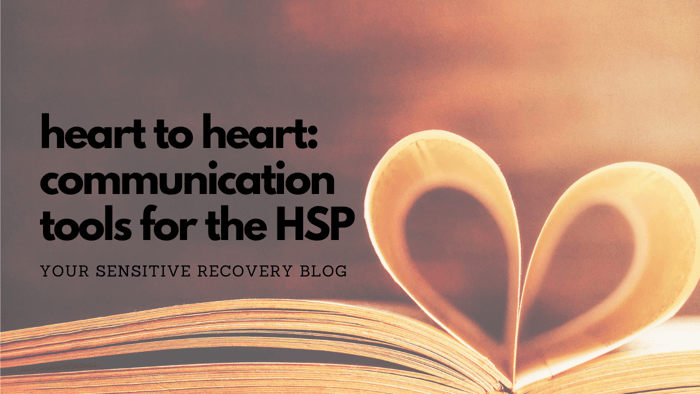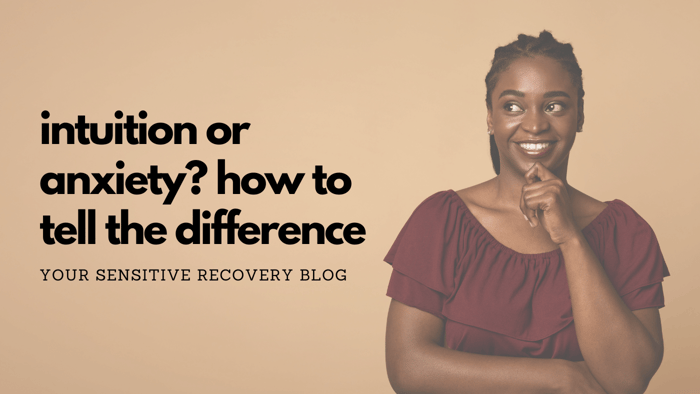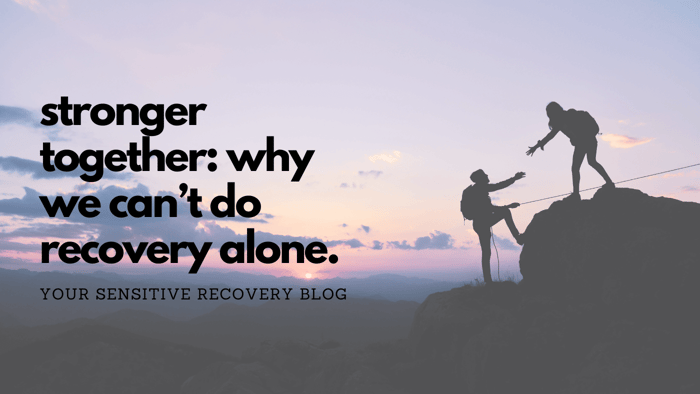The heart of human connection is in communication. Whether through spoken word, a shift in facial expression, or any other form, communication shapes our relationships and the trajectory of our individual growth. Highly Sensitive People possess many beautiful qualities that can help them navigate the intricacies of communication in a deeply profound way. Yet these same characteristics may present obstacles to effective communication as well.
With our depth of processing and heightened sensitivity to stimuli, HSPs can find themselves grappling with how to express themselves and maintain balance amidst the onslaught of information from interpersonal interactions.
In this post, we'll explore some HSP-specific insights and practical strategies to avoid the pitfalls of ineffective communication, harness your sensitive strength, and cultivate more meaningful connections.
"Do I have to spell it out?"
Sensitivity to subtlety is a characteristic many Highly Sensitive People understand well. In communication, it can show up as an expert ability to pick up on non-verbal cues and "read between the lines." The problem lies in assuming that everyone else is good at this too.
This is something I've struggled with in my personal life and have seen time and time again with my Highly Sensitive clients.
Subtle doesn't cut it, and hints don't work.
When it comes to effective communication, direct and deliberate is the way to go. Unfortunately, many of us began associating "direct" with being rude or unfeeling early on in life. This is especially true for HSP women who have certainly been at risk of being labeled "bitchy" or aggressive when even just approaching the realm of direct communication.
It's unfair. And the risk to our personal growth is immense. It's extremely important for Highly Sensitive People to practice being direct and deliberate, and to be careful not to assume that those around them are as adept as they are at catching the hints and deciphering the unspoken.
Otherwise, we will not get our needs met, and over time this leads to...
"I have no needs, I have no wants."
When we've gone long enough without adequate fulfillment of needs and desires, these parts of us close down in a bid for self-protection. Rather than risk the pain of once again being let down, we instead try to convince ourselves that we're entirely self-sufficient.
We lose touch with what we need and want and can feel overwhelmed if asked directly.
This can happen for another reason too:
Being empathetic and highly attuned to the needs of others, many HSPs naturally fall into caregiver roles. And they can be damn good at it. But this can happen so frequently that to their own detriment, sensitive folks began to make being self-sacrificing and "putting everyone else first" a core pillar of their identity.
Adrift in the sea of processing.
Another common communication hurdle for the HSP is the amount and depth of processing that's happening at any given moment. As a gift, this helps us to be naturally thoughtful and insightful when communicating...but sometimes a little slower.
I don't mean that HSPs are slow to process - often the pace itself is quite fast - but more information is being processed. The communication can appear slow however because unbeknownst to the outside observer, an HSP is considering multiple perspectives, examining the potential emotional ramifications to each of them, and preparing a nuanced response with the words and expressions that feel just right, all at the same time.
If the person you're communicating with does not offer you the space and patience for this processing, you can begin to feel flustered, irritable, or shut down.
The Tools
So how can Highly Sensitive People improve their communication and enhance their relationships and growth? Here are a few tools that will do just that:
- "Give me a minute to think about it." If you can practice getting these words out of your mouth before anything else happens, you'll be in good shape. This simple statement will allow you the space you deserve to process all the things, and it will hopefully lessen your partner's tendency to rush you and their confusion as to why you aren't responding right away.
- Active Listening in both directions. Many HSPs are talented at accurately reflecting back what they've heard or understood in communication, but we don't always get this in return. It's ok to ask for it. You can use a phrase like, "I'd like to know that you understand me. Could you tell me what you gathered from what I said?"
- Building Self-Awareness. Self-aware HSPs are better able to articulate their needs and boundaries, leading to more productive interactions. Your body will communicate to you when something you've said or want to say is misaligned with your true desires or crosses a personal boundary. Even if you do not feel safe or comfortable enough to make a correction, it can still be powerful to check in with yourself and acknowledge the signals. "I see you, Self. I understand you."
It's not always easy, and I don't always get it right. My husband has to ask me more times than I'd like to admit, "Please be more direct." Or worse - "Please speak up!" (Hey, I can't help it that everything, including my own voice, is often too loud for me 😅) But with an open mind, we can use every interaction as an opportunity to learn about ourselves and our loved ones, and to grow toward our highest selves.
As a Highly Sensitive Person, you're able to share your unique gifts through different types of expression. By using these tools and learning how to work with and honor your sensitivity, you too, can become a skilled, meaningful communicator.
✨ Josie Munroe, LMFT is a licensed therapist and owner of JosieMunroe.com and Your Sensitive Recovery As a recovered clinician and Highly Sensitive Person, she loves supporting others on their journeys to form new, empowered relationships with food, their bodies, and their sensitivity. Join the newsletter for a weekly boost of hope and inspiration. You deserve a recovery that works for you! ✨





